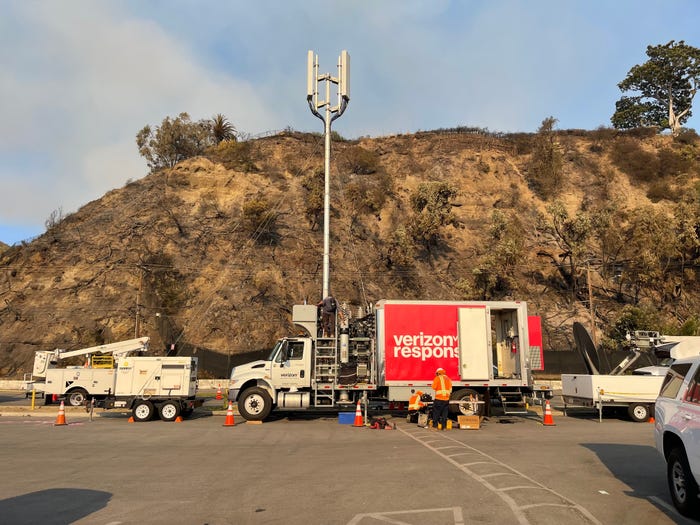Motorola Solutions to ‘exhaust’ legal options in UK over Airwave, if needed, CEO Brown saysMotorola Solutions to ‘exhaust’ legal options in UK over Airwave, if needed, CEO Brown says

Motorola Solutions CEO Greg Brown reiterated the company’s disagreement with a United Kingdom (UK) government watchdog’s provisional decision to implement significant price controls on the Airwave TETRA network, noting that Motorola Solutions is prepared to “exhaust” all legal appeals, if necessary.
In October, the Competition and Markets Authority (CMA) released its provisional decision in its investigation of Motorola Solutions’ ownership in Airwave, finding “competition concerns” that allow Motorola Solutions to make “supernormal profits” from the nationwide TETRA system in the UK.
To remedy the situation, the CMA has proposed limiting Motorola Solutions’ annual revenue from Airwave to less than 200 million pounds ($224.3 million), which would be less than half of the 433.5 million pounds ($486.2 million at current exchange rates) in revenue that Airwave reported in 2020. The CMA plans to release its final decision on the matter in February, according to schedule published on its website.
Motorola Solutions disagrees with the CMA findings and proposed remedies associated with Airwave, Brown said while speaking at the Barclays Global Technology, Media and Telecommunications Conference on Tuesday.
“I clearly respect the CMA, but I think their argument is legally and economically flawed,” Brown said during the conference, which was webcast. “I think it’s unprecedented, and I think it’s overreaching.
“We saw the provisional report that came out. We’ve given our reaction to that. The CMA have said that they are targeting a final decision in February. We will do what we need to do to defend our position and defend what we believe. We’ll see what the final decision looks like.”
Although the release of the CMA’s final decision is targeted for February, it “likely will take a few more months after a final decision” before the details and impacts of the remedy’s implementation are fully known, Brown said.
If Motorola Solutions disagrees with the outcome of the CMA investigation, the company is prepared to appeal the matter to the full extent allowed by law, according to Brown.
“If we need to defend and fight legally and appeal, we will exhaust every legal opportunity or avenue in front of us to defend the position.”
Brown previously has noted that it is possible that Motorola Solutions could negotiate with the UK Home Office to reach different financial terms than the significant decreases proposed by the CMA.
“It’s also worth mentioning that there is a notation in the actual provisional decision that includes a potential invitation for the Home Office and us to agree to a different arrangement than what the CMA has proposed,” Brown said during his company’s quarterly call with analysts in November. “That’s explicit and referenced embedded in the provisional [decision]. We would certainly be open to that conversation.”
However, Brown did not mention the possibility of a negotiated Home Office agreement during his interview on Tuesday at the Barclays conference.
One other aspect of the CMA investigation focused on whether Motorola Solutions had a conflict of interest in its “dual roles” of owning Airwave—the mission-critical TETRA network that supports UK public-safety personnel—and serving as the lead software and services vendor for the LTE-based Emergency Services Network (ESN). The ESN was supposed to replace Airwave by the end of 2019, but repeated delays have caused officials to question whether the ESN will be ready by the current target date at the end of 2026.
This “dual role” concern is largely moot now, because Motorola Solutions last month announced its plans to “exit” its role in the ESN, although Brown said that the separation has not been finalized yet.
“We announced at the end of Q3—on the earnings call—that we plan to exit our work on the ESN contract,” Brown said. “We have not signed an agreement with … the Home Office yet. We are working on that.
“We, with the customer, think it’s the right thing to do—for us to no longer participate in the ESN. That allows a little bit more clarity and autonomy for what they want to do on the ESN.”
Motorola Solutions did not announce its plans to exit its ESN until last month, but company filings early this year in the CMA investigations—documents not released publicly until November—indicate that the vendor giant had been considering the move since at least early this year or during the latter portion of 2021. At that point, the CMA investigation had just been announced, and the UK competition watchdog had stated that one of the potential remedies being considered was forcing Motorola Solutions to divest the highly profitable Airwave system.
Motorola Solutions is currently under contract to provide software and services for ESN until 2024, according to the company’s March 18 fifth supplementary submission to the CMA that was posted on the CMA website in November. The document seems to indicate that Motorola Solutions decided against continuing the ESN relationship after 2024 in an attempt to prevent the CMA from mandating an Airwave divestiture, although a key redaction in the document makes it difficult to be certain about all details.
“Motorola strongly believes this is a decision that Motorola should not have had to make,” according to Motorola Solutions’ fifth supplementary submission. “It remains Motorola’s view that it is egregious to threaten a divestiture order on a business that has operated entirely in accordance with the Government’s express blessing (first through the Home Office who welcomed Motorola’s acquisition in the knowledge that Airwave was in the right hands to deliver a smooth technical transition to ESN; and second through the CMA who after a careful review unconditionally approved the acquisition of Airwave).
“This is especially the case when Motorola is, quite rightly, not in fact accused of any wrongdoing. Nonetheless, this was the business context in which Motorola was placed, and provided the background against which Motorola took its business decision: a divestiture order of any kind would be extraordinarily damaging.”
Between the ESN announcement and the proposed CMA remedies associated with the Airwave investigation, Motorola Solutions could see its projected UK revenues for the next four years decrease by more than $1 billion.
CMA’s delayed timeline comes as the UK government has seen significant turnover at the highest levels in recent months, although it not clear whether this has had any impact on the CMA schedule or decisions.
On Oct. 25, Rishi Sunak became the UK’s third prime minister in less than three months. Sunak succeeded Liz Truss, who held office for about seven weeks after replacing Boris Johnson on Sept. 5.
Meanwhile, there also have been considerable change within the leadership role of the UK Home Office. Priti Patel resigned as Home Office secretary a day after Boris Johnson resigned as prime minister. Suella Braverman succeeded Patel as Truss became prime minister, but she resigned on Oct. 19 amid a controversy revolving around the use of a private e-mail account and was replaced briefly by Grant Schapps.
However, Schapps served as Home Office secretary for less than a week. When Sunak became prime minister after the Truss resignation, he reinstated Braverman to lead the Home Office.





